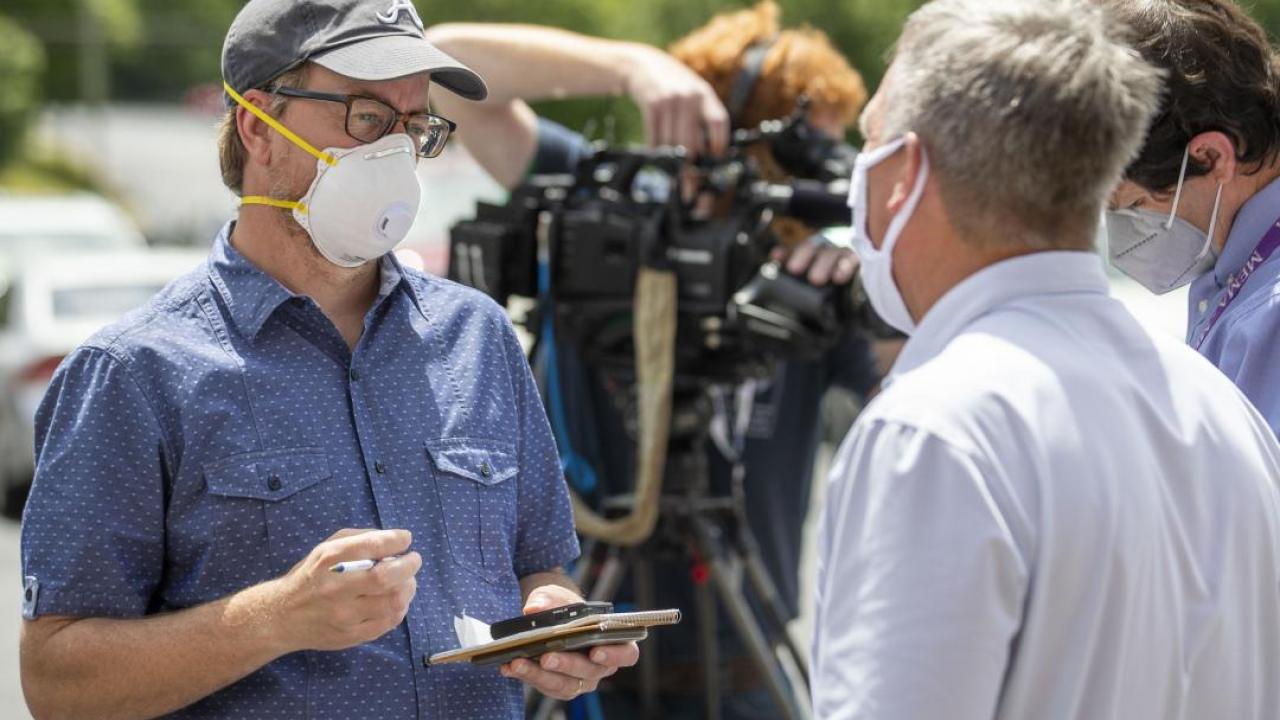
No Medicine Games During the Pandemic
My black referee bag sits shoved into a dark corner of my closet with everything jumbled inside. Yellow penalty flags crinkled from their last toss. A scorecard filled out in pencil. An upside-down referee hat.
Above the bag, my black-and-white striped referee shirts hang side by side. Throughout the year, they move in a steady stream from me to my washing machine to my dryer and back to me. It is strange to see them hanging there together now, clean, empty, unrumpled.
Like other sports, lacrosse ground to a halt in March amid fears of the coronavirus pandemic. Typically, I referee dozens of games each year, mostly during the spring season, though the sport is so popular now in the South that it is played year-round. The last game I officiated was March 10 in Montgomery, Alabama. Carthage College defeated Huntingdon College 17-8.
I have missed the sport ever since, partly because of what I do for a living. For more than 25 years, I have reported for newspapers. Like many journalists, I often write about trauma like mass shootings, fires, floods, tornadoes, hurricanes and wars. We have to be resilient to do this work. Healthy diversions help us function. Refereeing lacrosse is mine.
It started for me in Northern Virginia, where I played junior varsity and varsity lacrosse at Oakton High School. Later, I competed on men’s club teams in Fairfax, Richmond, Charlottesville and Atlanta. Native Americans created the sport, calling it a sacred “medicine game” that is meant to heal people.
Thirteen years ago, a fellow journalist convinced me to try on the stripes. Initially, I was reluctant to put down my lacrosse stick and pick up a referee whistle, but I’m glad I did. Through focus, determination and a lot of running, I moved up quickly through the levels, first officiating youth, then high school, then college. I have countless mentors to thank.
I savor being in the middle of the action. I enjoy the camaraderie with fellow officials. Running on a 110-yard field helps me stay in shape. I have gained more confidence communicating with screaming coaches. The extra income is nice. But the biggest reward for me is the mental therapy that comes from refereeing.
When I officiate, I must focus completely on the moment. I cannot be distracted by the story — or stories — I’m writing for The Atlanta Journal-Constitution. I cannot obsess over reaching elusive sources or worry about untangling knots in my writing or dwell on the difficult interview I just had.
For roughly two hours, I’m laser-focused on something else. That’s the key. When my game is over, I come back to my stories with a different perspective, unburdened by many of the worries that troubled me. It feels as if I am rebooting during each game. This helps me come back to my writing with new energy and fresh ideas.
As the pandemic began drawing headlines in early March, I jumped right into the action, sometimes writing on deadline from the front seat of my car. First, I reported on the frightened Grand Princess cruise ship passengers quarantined at Dobbins Air Reserve Base in Marietta. Then I covered a deadly outbreak at a large church in Cartersville. Then I wrote about how the pandemic tore through rural parts of Georgia and sickened hundreds of poultry plant workers, killing two of them. I have listened as people recalled their harrowing experiences battling the disease and as widows described saying goodbye to their dying husbands.
I am fortunate. My family is healthy. My wife and I are still employed. Cooped up together, we count our blessings. There have been challenges, however. Early on, I often reported and wrote about the pandemic all day and then went to bed bleary-eyed and burned out by the trauma I covered, troubled by confusing, anxiety-filled dreams and waking up around 3 a.m., unable to fall back to sleep. In some ways, this reminds me of my time reporting in Iraq years ago. Just like then, the life-or-death stories I am writing on deadline now pump me full of adrenaline, making it hard for me to focus on anything else and stay asleep at night. My mind keeps racing.
I know this is not healthy, so I am forcing myself to do other things. I am spending more time with my family. I am playing catch more often with my 11-year-old son, Casey, a budding lacrosse athlete. I am reading voraciously. I am tending to a new strawberry patch, tomato plants and an expansive herb garden in my backyard. Along my fence, I have planted a long row of giant sunflowers. In between writing stories, I step outside and marvel at how fast they are growing. Watching “The Office” each night with my family keeps me laughing.
But none of this is like being on the lacrosse field in the moments just before the first faceoff, sensing the electric anticipation in the stands and among the athletes, hearing the field hush before the first whistle. I miss the stunning dodges, the rocket shots, the acrobatic goalie saves. I even miss the coaches yelling at me. I miss how I can become nearly invisible in the flow of the game, forgetting my deadlines, forgetting my stories, forgetting myself.
Sometimes, you know you have done a good job officiating when the fans, players and coaches don’t remember you were ever there. If I were back on the field refereeing at this moment, I am certain I would not be thinking about the pandemic. And then I would return to my reporting with new energy and fresh ideas, while looking forward to my next medicine game.
Jeremy Redmon writes for The Atlanta Journal-Constitution and officiates lacrosse in the South. A longtime member of US Lacrosse, he serves on the board of the Georgia Lacrosse Officials Association. He graduated in 2019 from the University of Georgia’s Master of Fine Arts program in narrative nonfiction writing. Follow him on Twitter at @JeremyLRedmon.
Jeremy Redmon
Categories
Tags
Related Articles




